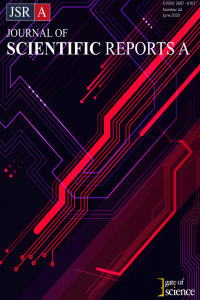SKALER ALAN KOZMOLOJİLERDE MANYETİK ALAN KAYNAKLI BAZI KOZMOLOJİK MODELLER
Skaler alan, ideal akışkan, elektromanyetik alan, Marder metriği, Bianchi tipi uzay-zamanlar
SOME COSMOLOGICAL MODELS WITH MAGNETIC FIELD IN SCALAR FIELD COSMOLOGIES
Scalar field, perfect fluid, electromagnetic field, Marder’s metric, Bianchi type space-times,
___
- [1] H. J. Blome, T. L. Wilson, “Primordial Magnetic Field Measurements From The Moon”, 28th Annual Lunar and Planetary Science Conferece, Houston-Texas, 123 (1997).
- [2] A. Pradhan, K. Jotania, A. Singh, “Magnetized String Cosmological Model in Cylindrically Symmetric Inhomogeneous Universe with Time Dependent Cosmological-Term Lambda”, Brazilian Journal of Physics, 38,167-177 (2008).
- [3] R. Beck, “Cosmic Magnetic Fields: Observations and Prospects”, ed. F.M. Rieger, AIP Conf. Proc. (astro-ph/arXiv:1104.3749v1), Texas Symposium (2010).
- [4] P.P. Kronberg, “Cosmic magnetic fields, and implications for HE particle anisotropies”, The XVI International Symposium on Very High Energy Cosmic Ray Interactions (ISVHECRI 2010), Batavia, IL, USA (28 June - 2 July 2010).
- [5] F. Miniati, A.R. Bell, “The 6th Annual International Conference on Numerical Modeling of Space Plasma Flows in Valencia”, Spain, (ASTRONUM-2011), 459, 125-130 (2011).
- [6] H. Weyl, “Gravitation and Elecromagnetism”, Akad and Wiss Pres., Berlin. 2, 465-468 (1918).
- [7] H. Weyl, “Space, Time and Matter”, Dover Publication Inc., London (1922).
- [8] J. A. Belinchon, T. Harko, M. K. Mak, “Full Causal Buk Viscous Cosmological Models with Variable G and Lambda”, gr-qc/0112020 (2001). [9] M. K. Mak, T. Harko, “Bianchi Type I Universes with Causal Bulk Viscous Cosmological Fluid”, gr-qc/010069 (2001).
- [10] G. Mendell, “Magnetic effect on the viscous boundary layer damping of the r-modes in neutron stars”, gr-qc/0102042 (2001).
- [11] B.C. Paul, “Viscous Cosmologies with Extra Dimensions”, gr-qc/0106031 (2001).
- [12] İ. Tarhan, “Astr. Nachr.” 313, 3 (2002).
- [13] G. Mohanty, B. Mishra, R. Das, “Bull. Inst. Math.”, 28, 43-51 (2000).
- [14] G. Mohanty, U. K. Panigrahy, R. C. Sahu, “Astrophysics and Space Science”, 281, 633–640 ( 2002).
- [15] G. Mohanty, R. C. Sahu, U. K. Panigrahy, “Astrophysics and Space Science”, 284, 1055-1062 (2003).
- [16] S. Aygün, İ. Tarhan, “The Decay of Massive Scalar Field in Non-Static Gödel Type Universe with Viscous Fluid and Heat Flow”. International Journal of Theoretical Physics, Int. J. Theor. Phys., 47, 3257-3266 (2008).
- [17] S. Aygün, İ. Tarhan, H. Baysal, “Scalar field theory and energy-momentum problem of Yilmaz-Rosen metric in general relativity and teleparallel gravity”, Astrophysics and Space Science, Astrophys. Space Sci., 314, 323 (2008).
- [18] R.C. Sahu, G. Mohanty, “Astrophysics and Space Science”, 306, 179-183 (December 29, 2006).
- [19] L. O. Pimentel, “Astrophysics and Space Science”, 116, 395-399 (1985).
- [20] G. Mohanty, B. Mishra, R. Das, “Theo. Ve Appl. Mech.”, 26, 71 (2001).
- [21] R.C. Sahu, U. K. Panigrahi, “Astrophysics and Space Science”, 288, 601-610 (2003).
- [22] U. K. Panigrahi, R. C. Sahu, “Czech. J. Physc.”, 54, 543 ( 2004).
- [23] N.P. Gaikwad, M.S. Borkar, S.S. Charjan, “Bianchi Type-I Massive String Magnetized Barotropic Perfect Fluid Cosmological Model in the Bimetric Theory of Gravitation”,Chinese Physics Letters, 28, 089803 (2011).
- [24] P. S. Letelier, “Phys. Rev.”, D20, 1294-1302 (1979).
- [25] P. S. Letelier, “Phys. Rev.”, D28, 2414-2419 ( 1983).
- [26] J. Stachel, “Phys. Rev.”, D21, 2171-2181 (1980).
- [27] D. G. Yamazaki, K. Ichiki, T. Kajino, G.J. Mathews, astro-ph/0610234v1.( 2006).
- [28] F. A. Membiela, M. Bellini, “Primordial Large-Scale Electromagnetic Fields From Gravitoelectromanyetic Inflation”, gr-qc/0811.0993v1. (2008).
- [29] S. W. Hawking, W. Israel, “General Relativity: An Einstein Centenary Survay”, Cambridge University Pres, Cambridge. 277 - 291(1979).
- [30] L. D. Landau, E.M. Lifshitz, “The ClassicalTheory of Fields”, Bergamon Pres. 239 – 254 (1987).
- [31] L. P. Hungston, K. P. Tod, “An Introduction to General Relativity”, Cambridge University Pres, Cambridge. 136 – 143 (1990).
- [32] H. Stephani, Relativity: “An Introduction to Special and General Relativity”, Cambridge University Press. 233 – 248 (2004).
- [33] M. Demianski, “Physics of the Expanding Universe”, Springer-Verlag, Berlin.p. 374 (1979).
- [34] L. Marder, “Proc. Roy. Soc. Lond”, A244, 524-537 (1958a.).
- [35] L. Marder, “Proc. Roy. Soc. Lond.”, A246, 133-143 (1958b.).
- [36] M.A.H. MacCallum, “In General Relativity and Einstein Centenary Survey”, Cambridge University Press, Cambridge. 194 – 221 (1979).
- [37] Ya. B. Zel’dovich, Sov. Sci. Rev. E Astrophys. Space Phys., 5, 1-37 (1986).
- [38] D. Kramer, H. Stephani, E. Herlt, M.A.H. MacCallum, E. Schmutzer, “Exact Solutions of Einstein’s Field Equations”, Cambridge Univ. Pres. Cambridge. 356 – 384 (1980).
- [39] C.B. Collins, E.N. Class, D.A. Wilkinson, “Exact Spatially Homogeneous Cosmologies”, General Relativity and Gravity, 12, 805 ( 1980).
- [40] S. Selak, “Astrophysics and Space Science”, 109, 123-130 (1985).
- Başlangıç: 2020
- Yayıncı: Kütahya Dumlupınar Üniversitesi
BİTKİLERDE MİKRONÜKLEUS TESTİ İLE GENOTOKSİK HASARIN DEĞERLENDİRİLMESİ
Yasin CANTAŞ, Burhanettin DURMUŞ
ASENKRON MOTOR ROTOR ARIZALARININ ANALİZİ
Abdurrahman Ünsal, Oktay Karakaya
ESNEK KÜMELERDE SIRALAMA ÜZERİNE BAZI YENİ SONUÇLAR
TIBBİ KULLANIM AMAÇLI DENEY KABİNİ TASARIMI VE İMALATI
Onur KOÇAK, Mehmet Cüneyt ŞEN, Erdi ARSLAN, Arif KOÇOĞLU
LİNEER OLMAYAN OLUŞUM DENKLEMLERİNİN ÜSTEL RASYONEL FONKSİYON METODUYLA ÇÖZÜMÜ
Melike Kaplan, Arzu Akbulut, Mehmet Naci ÖZER
KÜTAHYA’DA EMNİYET KEMERİ KULLANIMI ALIŞKANLIKLARININ DEĞERLENDİRİLMESİ
Şafak BİLGİÇ, Yaşar VİTOŞOĞLU, Polat YALINIZ
Hüseyin Ünal, Salih Hakan Yetkin, Bayram Poyraz
KÜRESEL ZOO ÇEŞİTLİLİĞİN KORUNMASINDA ÖNEM TAŞIYAN HAYVANAT BAHÇESİ VE AKVARYUM BİRLİKLERİ
SKALER ALAN KOZMOLOJİLERDE MANYETİK ALAN KAYNAKLI BAZI KOZMOLOJİK MODELLER
